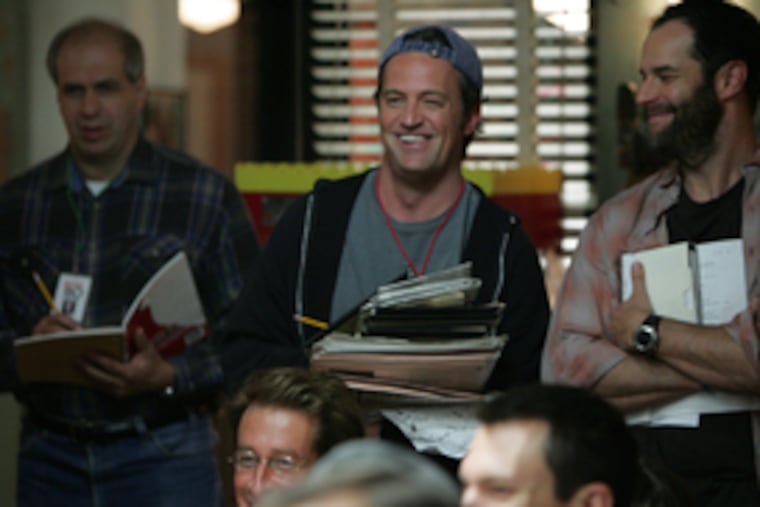Ellen Gray | It's lights out for Sorkin's 'Studio 60'
STUDIO 60 ON THE SUNSET STRIP. 10 tonight, Channel 10. FOR A FEW million loyal viewers, the 2006-07 TV season ends tonight, when NBC airs the last of several long-delayed episodes of "Studio 60 on the Sunset Strip."

STUDIO 60 ON THE SUNSET STRIP. 10 tonight, Channel 10.
FOR A FEW million loyal viewers, the 2006-07 TV season ends tonight, when NBC airs the last of several long-delayed episodes of "Studio 60 on the Sunset Strip."
I'm hoping for something that can rightfully be called a finale - and I think we'll get one - but I know there's nothing that could completely satisfy some of the people who've complained to me in recent months about the show's cancellation.
Aaron Sorkin first won them over with "The West Wing," or even earlier, with "Sports Night," and I'm sure some of them would follow him into hell.
Some might argue they already have.
Many of Sorkin's fervent fans are the very people the networks most need to reach right now - the ones who've written off much of broadcast TV, leaving some network suits this year staring at Nielsen ratings that seem to be in free fall.
But this is not a rant about why NBC was wrong to cancel "Studio 60." If Kevin Reilly, the network's recently replaced entertainment chief, could throw his body over only one low-rated drama, I couldn't be happier that he chose "Friday Night Lights."
Besides, plenty went wrong with "Studio 60" long before Reilly made the final call, starting with the "Snakes on a Plane" phenomenon.
Remember "Snakes on a Plane"? Samuel L. Jackson, and a plane full of snakes? Months before that bomb went off, bloggers everywhere seemed to be going nuts about what seemed to them a can't-miss premise.
But then it did miss, leading some in my own media-centric universe to question whether the phrase "bloggers everywhere" might not describe a much smaller set of moviegoers than previously believed.
Or even a group of people under house arrest.
"Studio 60," too, was an Internet darling, with an early version of Sorkin's pilot script in circulation months before a single scene had been shot. I read it myself, not wanting to be left out after getting the impression that a number of TV critics, not to mention half the college students in America, had been there before me.
I'll never do that again - it spoiled something. I'm here to write about television, not just scripts, and I think Sorkin (who, for all I know, may have leaked it himself) at least deserved the chance to show us what he had in mind.
As it turned out, though, what he had in mind was getting some stuff off his chest, both about the way the TV business works and his personal life. If that stuff ultimately proved less interesting to many TV viewers than to Sorkin himself, well, that may be why most therapists charge so much.
It's not, though, as if someone couldn't have seen this coming.
Year in, year out, viewers have proven themselves to be not terribly interested in the behind-the-scenes aspects of show business. Yet NBC last season chose to put on not one, but two series about life behind the scenes of late-night comedy sketch shows not unlike "Saturday Night Live."
The other one, "30 Rock," has been renewed, but its audience, which averaged 5.4 million viewers this past season, was smaller than even "Studio 60's."
What, other than Sorkin's reputation for being a smart writer who had problems delegating and tended to push deadlines, would make anyone at NBC think viewers would be interested in learning why Matthew Perry's character, a smart writer named Matt Albie, has trouble delegating or meeting deadlines?
By the time Sorkin finally gave Matt a drug problem - something he'd previously reserved for Bradley Whitford's Danny Tripp - it was already too late to argue that Matt was a wholly fictional character.
Fictional characters, though, are what made Aaron Sorkin interesting to so many of us in the first place.
I'm not saying bits and pieces of Sorkin's life - and many, many of his opinions - might not have made their way into "The West Wing" over the years.
But the personal stuff got no more than a wink and a nod.
Because for all its preachiness and occasional over-the-top plot lines, at its heart, "The West Wing" had one: It was about people trying to make the world a better place.
It's easy to cut people like that a whole lot of slack.
But the people trying to make late-night TV a better place?
Maybe not so much. *
Send e-mail to graye@phillynews.com.